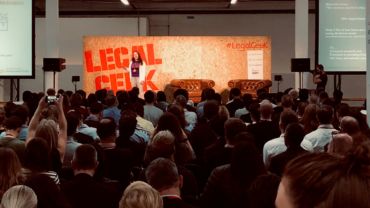The Legal Geek Conference has rapidly become a major date in the calendar for the legaltech community. Doubling in size each year since it started in 2016, over 2,000 delegates descended upon east London’s historic Truman Brewery venue last week from over 40 countries, bringing together legaltech startups from across the globe, alongside members of the wider legal community.
By 9.15am, the conference was already near capacity. In what has become synonymous with the Legal Geek brand, the location was a rustic, laid back warehouse—and the dress code strictly ‘no tie’ —to set the tone for the day. It was, as organiser Jimmy Vestbirk said as he kicked of proceedings, not meant to be a formal conference and about hierarchy, but about collaborating, and being equal.
Proceedings were kicked off with ‘high-fives’, which Jimmy has always encouraged as a more equal and optimistic form of greeting than the traditional handshake. It had more of the feel of a festival than a conference as we would traditionally know it.
Aside from the fanfare and excitement, though, what was Legal Geek 2018 going to inform us about the legaltech startup ecosystem one year on?
Inspiring insights of bright futures
The original conference in 2016 coincided with a peak in the number of legaltech startups being founded. Since then, both the Legal Geek conference, and the Legal Geek community have continued to evolve—carving further inroads within the legal market. Law firms have created their own labs and incubators to help accelerate the development of startups, and recently Barclays have entered the space through its LawTech EagleLabs initiative, creating a consortium with the Law Society, the 17 law firms on its panel and some leading academic institutions to co-ordinate support for startups.
Legaltech is not a recent phenomenon, and Thomson Reuters has long been a leading provider of technology to the legal sector. What Legal Geek is successfully doing is bringing a renewed focus to disruption and innovation of the established norms that exist in the legal market. Many of the legaltech startups are using artificial intelligence techniques; the scale of cloud computing; and, increasingly, experimenting with blockchain technologies in the solutions they are developing.
While it is acknowledged that there is much hype in this sector, this year’s conference shined a light on the hard yards needed to be invested by startups and their customers before real value can be realised. Hella Hoffman, Senior Data Scientist in the Thomson Reuters Labs, spoke about this on the main stage, explaining that to make the most of artificial intelligence, the key ingredients are—data (lots of it), human expertise, technology, and design. While we’re mostly still in the early stages of innovation, there were good examples of startups who are now graduating into a scale up phase—most notably Kira Systems that raised $50m earlier this year.
During the first morning session, Lord Keen, a minister in the UK Ministry of Justice, and Christina Blacklaws, President of the Law Society of England and Wales, announced a new panel that aims to make the UK the ’perfect’ destination for LawTech companies. The LawTech Delivery Panel will tackle challenges in areas including: regulation; ethics; commercial dispute resolution; and, education and training. Blacklaws urged startups to come forward and speak about their ideas, challenges and opportunities.
Thomson Reuters, the world’s leading provider of news and information-based tools to professionals, a headline sponsor at the Legal Geek Conference, announced it was looking for a legaltech cohort to join its Incubator that forms part of the Thomson Reuters Labs. This initiative will provide startups accepted onto the programme with access to some of our data and tools, access to mentorship and the ability to work with our product and Thomson Reuters Labs teams, and promotion and exposure to our customers, amongst other things.
Jim Leason, Customer Proposition Lead for Thomson Reuters Legal Professionals Europe said: “Thomson Reuters has a very clear innovation agenda but we know we cannot do everything. Partnering is a necessary part of our strategy, and working with startups who are innovating to deliver enhanced value to our customers around our products is a key component of this strategy”. Thomson Reuters recently announced details of a collaboration between Berlin based startup, Synergist and its Contract Express solution delivering the capability to provide a negotiation capability alongside its market leading document automation tool.
Tech adoption
Moving the needle forward on tech adoption was a prevalent theme throughout much of the Legal Geek Conference. Shmuli Goldberg of LawGeex told delegates that the considerable majority of legal startup pilots in law firms or in-house legal departments are “failing because they aren’t very good at buying legaltech. They shouldn’t be buying legaltech based on a curiosity and interest in AI, for example, they should be trying to fix a problem or improve efficiency”.
Lawyer Catherine Krow, Founder and CEO of Digitory Legal, a US-based legal budgeting and resource management platform, highlighted the importance of “getting a pilot off the ground” at a law firm, and that too many pilots are at risk of dying on the vine. “Not because the product is bad, but because lawyers don’t have the capacity to try it”.
To combat this, Krow said, “there needs to be messaging and backing from a firm’s leadership that a tech pilot is important”. It was also explained that there needs to be clear messaging around expectation of a pilot’s efficacy and outcomes. She added that the legaltech vendor should assist the firm in evidencing the results in which the new technology delivered during the pilot, and that it has ultimately benefited the client and drove efficiency.
Also speaking on the subject, Emily Foges, CEO of Luminance, said that the legal profession is now embracing technology, and shifting from being an industry historically averse to change. However, Foges, drawing on her experience of working with organisations, emphasised how pivotal measuring outcomes and presenting robust empirical data can be in changing attitudes towards the introduction of new technology—by demonstrating to clients and internally that it can help deliver better results.
Though, most law firms tend not to measure such outcomes to such an extent—things are changing, she added. Interestingly, Foges told delegates that she has seen much faster take up of technology in European and Asia-Pacific firms “because they are embracing the idea that something has got to change” and “there is a need to make a difference”.
A little closer to home, Freshfields’ tech innovation team gave a talk sharing insights on what it is like to build a startup and tech platforms within a law firm. There were many parallels with launching an independent startup, for example, needing to seek buy-in and investment—the group explained how they worked with a small group of the firm’s clients to develop a new platform. Instead of waiting to wheel out a Rolls Royce version—they asked their external clients for their feedback and insights during the planning—which ended up informing development of the platform.
This approach was a ‘new bold way of working’, with their internal lawyers also playing a role to test many of the features and offer feedback. Alexandra Wyer, Associate at Freshfields, said “bringing the firm’s lawyers on this journey has helped inspire new ways of working, and brings around the cultural change needed to enforce such change”.
Humanity within the legaltech revolution
Legal Geek this year was about so much more than just tech, though.
Throughout the day there were several inspiring talks ranging from mental health and agile working, to turning the dial up on gender equality in the legal profession.
These sessions provided a somewhat welcome respite in between the abundance of fast-pace Ted-Talk style legaltech presentations, and it was equally pleasing to see such important topics high on the agenda, even at a tech conference.
The future
Legal Geek 2018 was another rousing success. And it’s clear that as a legaltech community gathering—it is continuing to evolve—largely evidenced by the key industry players making big waves in that space by supporting and leveraging legaltech startups, as well as increasing investment in tech advancements from law firms and in-house legal departments alike.
Even though the legal services market faces some challenges ahead, the legal community continues to seek innovative solutions to alleviate its pain points—through improved efficiencies, risk reduction and client care—as well as creating new opportunities to deliver value. Ultimately, the perception of legaltech is that it is shifting towards adoption—though there is still some way to go in establishing a widespread cultural change to technology enabling new ways of working. The fact that the Legal Geek conference has doubled in attendance year-on-year is a good barometer of the momentum that now exists.
The challenge for Legal Geek, and its community now, is to get the industry through the inevitable hype cycle as legaltech moves from a peak of inflated expectations (arguably where we are now) through a phase of disillusionment, before maturing into the phase of enlightenment and accelerated productivity. This is going to require continued focus and investment and the enthusiastic optimism that exists in this community. But it will not be easy.
Read about the Women in LawTech session at the Legal Geek 2018 Conference here.



